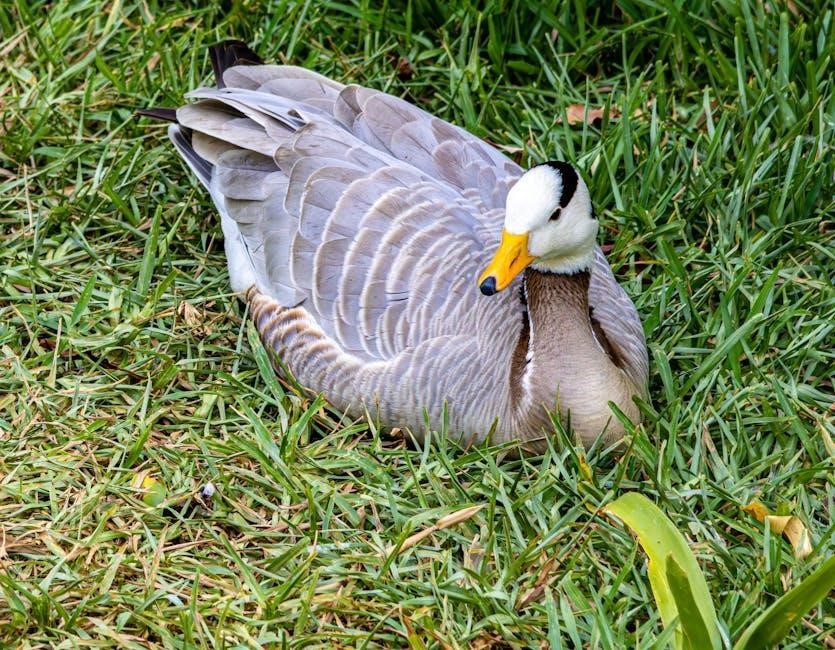Guided goose hunting offers a strategic experience‚ combining expert knowledge with precise techniques. Guides provide insights into decoy placement‚ locations‚ and timing‚ enhancing hunt success.
What is a Guided Goose Hunt?
A guided goose hunt is an organized hunting experience led by an experienced guide or outfitter. These professionals provide expertise‚ equipment‚ and access to prime locations‚ ensuring a well-planned and executed hunt. Guides often have extensive knowledge of goose behavior‚ migration patterns‚ and local regulations‚ maximizing the chances of a successful hunt. Participants typically join small groups‚ benefiting from the guide’s strategic setups‚ including decoy placement and calling techniques. This approach is ideal for both novice hunters seeking to learn and seasoned hunters aiming to optimize their experience. Guided hunts often include logistics support‚ such as permits‚ gear‚ and field preparation‚ allowing hunters to focus solely on the hunt itself.
Why Choose a Guided Hunt?
Choosing a guided goose hunt offers numerous advantages‚ particularly for those seeking a hassle-free and productive experience. Guides possess extensive knowledge of goose behavior‚ migration patterns‚ and optimal hunting locations‚ significantly increasing the likelihood of success; They handle logistics such as permits‚ decoy setups‚ and equipment‚ allowing hunters to focus on the experience. Novice hunters benefit from expert instruction‚ while experienced hunters can refine their skills and strategies. Guides also ensure compliance with regulations‚ reducing legal risks. Additionally‚ guided hunts often provide access to private or prime hunting areas‚ enhancing the overall quality of the hunt. This makes guided hunts a valuable investment for both learning and enjoyment.
Key Considerations for a Successful Guided Goose Hunt
Ensure proper licensing‚ choose optimal locations‚ and time your hunt during active migration periods. Effective decoy setups and experienced guides significantly enhance success rates in guided hunts.
Licensing and Permits: What You Need to Know
Before embarking on a guided goose hunt‚ ensure you have the necessary licenses and permits. These typically include a valid hunting license‚ waterfowl stamp‚ and any required state or federal permits. In some regions‚ an unguided game bird license may be needed if hunting without an outfitter. Additionally‚ check for specific tags or permits for the species of geese you’re targeting. Failure to comply with licensing requirements can result in fines or legal consequences. Always verify local regulations and consult with your guide or wildlife agency to ensure all documentation is up to date and valid for your hunting location.
Best Locations for Guided Goose Hunting
Prime locations for guided goose hunting can be found across North America‚ with hotspots in regions known for abundant waterfowl populations. The North Platte River in Wyoming is renowned for its guided hunts‚ offering scenic landscapes and productive hunting grounds. Canada’s prairies are another top destination‚ with vast fields and wetlands attracting snow geese and Canada geese. The Eastern Seaboard‚ particularly areas like Chesapeake Bay‚ is a migratory hotspot‚ making it ideal for guided hunts. Additionally‚ regions with marshy backwaters along rivers‚ as revealed by aerial maps‚ often hold puddle ducks and geese. Guides typically have extensive knowledge of these areas‚ ensuring hunters access the best spots for a successful and memorable experience.
Timing: When is the Best Season for Goose Hunting?
The timing of a guided goose hunt is crucial for success‚ as it aligns with migratory patterns and bird behavior. Peak seasons typically occur during spring and fall migrations‚ when geese are most active. Guides often recommend hunting during early morning and late evening‚ as these are prime feeding times. Weather conditions‚ such as cold fronts‚ can drive geese to move‚ creating ideal hunting opportunities. In regions like Canada and the northern U.S.‚ September to November is prime time‚ while southern areas may see activity from November to February. Guides use their expertise to scout patterns and adjust strategies based on seasonal shifts‚ ensuring hunters are in the right place at the right time.
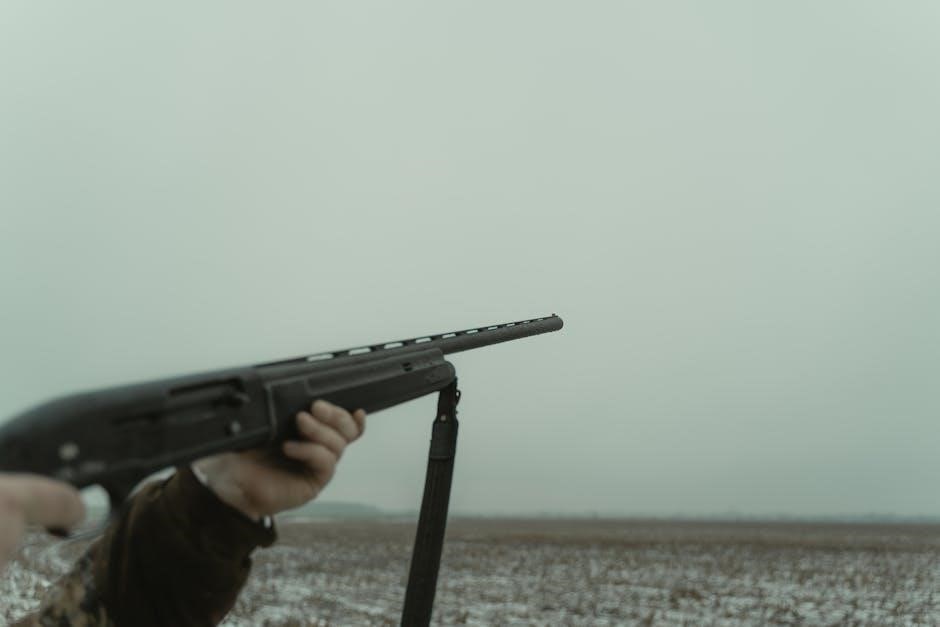
Essential Gear for a Guided Goose Hunt
A reliable shotgun‚ appropriate ammunition‚ and high-quality decoys are critical. Blinds‚ camouflage clothing‚ and calls also play key roles in a successful hunting strategy and setup.
Decoys: Types and Tips for Effective Use
Decoys are a cornerstone of guided goose hunting‚ requiring careful selection and placement. Full-body and silhouette decoys mimic real geese‚ enhancing visibility and attraction. Using at least three dozen decoys ensures better visibility‚ especially in open fields or snowy conditions. Positioning them in natural feeding or resting patterns‚ such as family groups‚ increases realism. Incorporating movement‚ like flappers or spinners‚ adds dynamism and draws geese closer. Camouflage and blending with the surroundings are crucial for effectiveness. Guides often mix species-specific decoys‚ such as Canada geese and snow geese‚ to create a diverse spread. Regular maintenance and realistic painting ensure decoys remain convincing. Proper placement and variety are key to luring geese effectively during a hunt.
Clothing and Camouflage: Staying Concealed
Clothing and camouflage are essential for a successful guided goose hunt‚ as geese have keen eyesight. Wearing earth-toned or camouflage gear helps hunters blend into their surroundings‚ reducing the chances of being detected. Face masks and gloves are critical for concealing skin tones‚ while layered clothing provides comfort in varying weather conditions. Avoiding shiny objects and bright colors is vital to maintain a natural appearance. Guides often recommend using portable blinds or natural cover like grasses to stay hidden. Proper camouflage ensures hunters remain undetected‚ increasing the likelihood of geese approaching the decoy spread. Attention to detail in clothing and concealment significantly enhances the hunting experience.
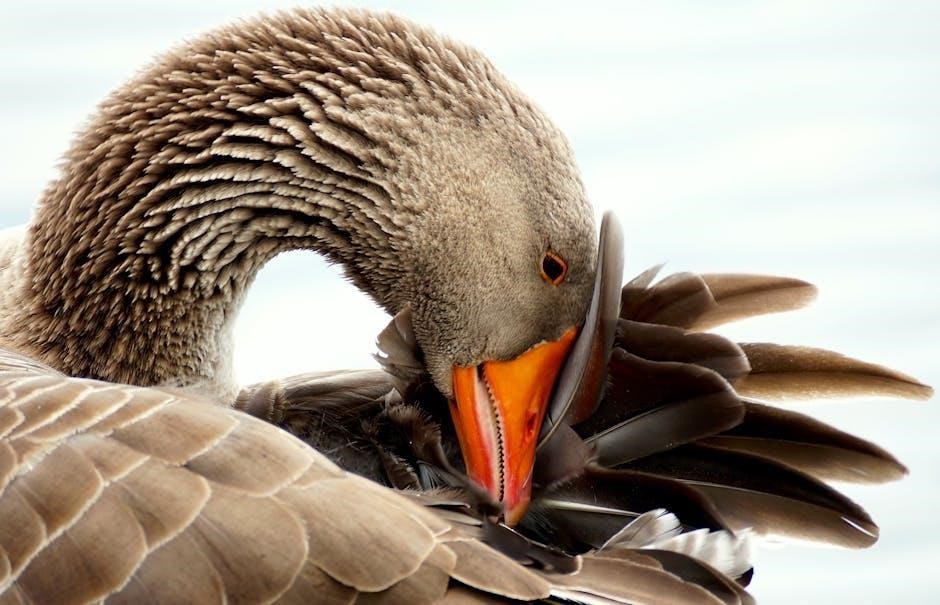
Hunting Techniques and Strategies
Expert guides employ effective calling‚ decoying‚ and positioning to attract geese. Strategic layouts and precise timing ensure a successful hunt‚ leveraging nature and experience for optimal results.
Calling and Decoying Geese: Expert Tips
Effective calling and decoying are critical for attracting geese. Guides recommend using realistic decoy spreads‚ including a mix of feeding‚ resting‚ and sentinel decoys to mimic natural behavior. Flagging and motion decoys add realism‚ while high-quality calls‚ such as honkers and migrators‚ help draw geese in. Varying call tones and cadences can mimic a flock’s communication‚ making the setup more convincing. Timing is key‚ as geese are most responsive during early morning and late afternoon. Guides often position decoys in open areas with a clear landing zone‚ ensuring geese can see and approach the spread easily. Combining these strategies creates an irresistible setup for successful hunting.
Positioning and Layouts: How to Set Up for Success
Proper positioning and layout are essential for a successful guided goose hunt. Guides typically arrange decoys in realistic feeding or resting patterns‚ often using 2-3 dozen decoys for visibility. Positioning near water sources or open fields‚ where geese naturally land‚ is key. Wind direction is critical; decoys should face into the wind to mimic geese landing naturally. Hunters are concealed in blinds or natural cover like grasses or snow. Clear landing zones within the decoy spread encourage geese to approach confidently. Scouting beforehand ensures the layout matches the geese’s habits‚ maximizing the chances of a successful hunt. Attention to detail in setup enhances the effectiveness of the hunt.
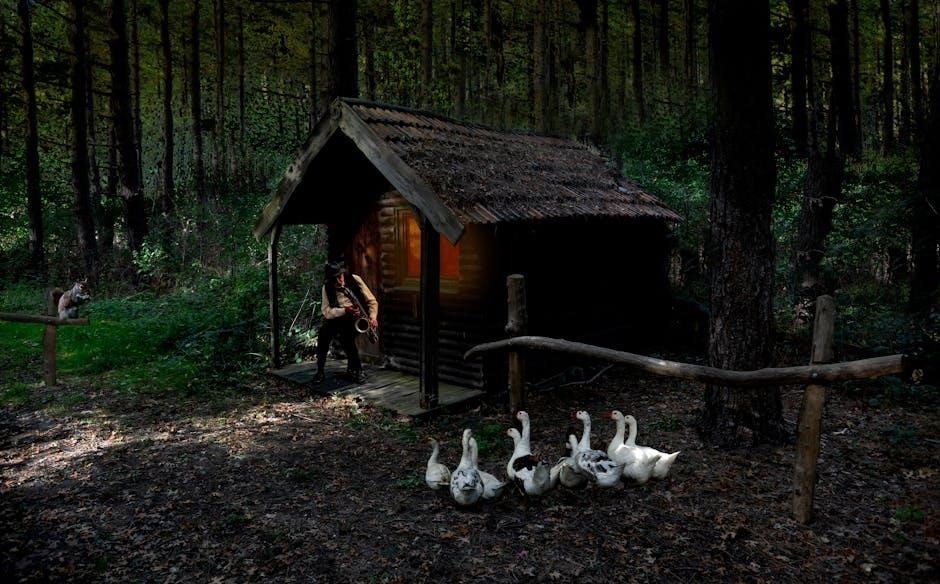
Safety and Ethics in Guided Goose Hunting
Safety and ethics are paramount in guided goose hunting; Guides emphasize firearm safety‚ proper handling‚ and responsible practices to ensure a secure and sustainable hunting experience.
Firearm Safety: Best Practices in the Field
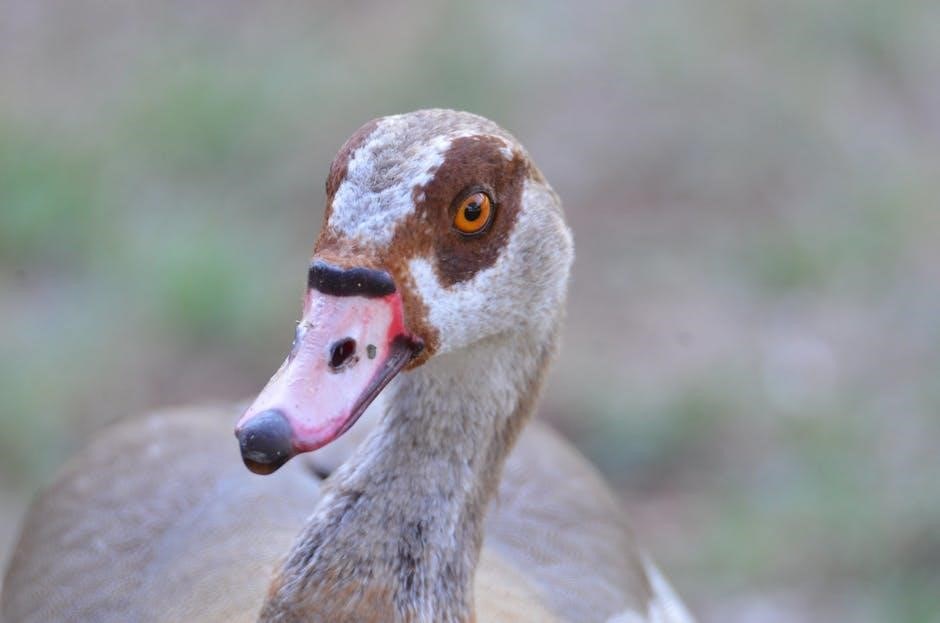
Firearm safety is critical in guided goose hunting. Always treat firearms as loaded‚ keep the muzzle pointed away from people‚ and use the safety until ready to shoot. Guides emphasize proper handling‚ ensuring all participants understand and follow safety protocols. Be aware of your surroundings‚ including other hunters and bystanders‚ to avoid accidents. Store firearms securely when not in use and ensure they are unloaded. Adhere to local regulations and ethical hunting practices to promote a safe and responsible experience. Proper training and preparedness are essential for a secure and enjoyable hunt.
Etiquette and Respect for the Environment
Etiquette and environmental respect are vital for a responsible guided goose hunt. Always follow local regulations and hunting ethics to ensure sustainable practices. Respect private property by obtaining permissions and avoiding trespassing. Minimize waste by properly disposing of shells‚ decoys‚ and other gear. Avoid disturbing natural habitats and wildlife beyond the hunt. Keep noise levels low to maintain a peaceful environment for both animals and other hunters. Leave the hunting area in the same condition as found‚ removing all personal items. Guides often emphasize ethical behavior‚ so listen to their instructions to promote a positive and respectful hunting experience. By adhering to these principles‚ hunters help preserve nature for future generations.
A guided goose hunt offers unforgettable experiences‚ combining expert strategies with thrilling adventures. It ensures memorable moments for hunters of all skill levels.
Final Tips for a Memorable Guided Goose Hunt
For a memorable guided goose hunt‚ scout locations in advance to identify active goose habitats. Time your hunt during peak migration seasons for better success rates. Use high-quality decoys and calls to attract geese effectively‚ and ensure your gear is well-maintained. Stay concealed with proper camouflage and remain patient‚ as geese can be unpredictable. Always follow your guide’s instructions‚ as their expertise can significantly improve your experience. Respect the environment by minimizing waste and avoiding sensitive habitats. Lastly‚ capture memories through photos or journals to cherish your adventure. A guided hunt offers unparalleled opportunities to connect with nature and refine your hunting skills.
Why Guided Hunts are Worth the Investment
Guided goose hunts offer unparalleled value for hunters seeking a premium experience. Expert guides provide local knowledge‚ ensuring access to prime locations and optimal timing for successful outings. Their insights into decoy placement‚ calling techniques‚ and bird behavior significantly increase your chances of success. Additionally‚ guides handle logistics‚ allowing you to focus on the hunt rather than planning. This investment enhances safety and ensures ethical hunting practices. For both novice and experienced hunters‚ guided hunts deliver a well-organized and memorable adventure‚ making them a worthwhile expenditure for those passionate about waterfowl hunting.
